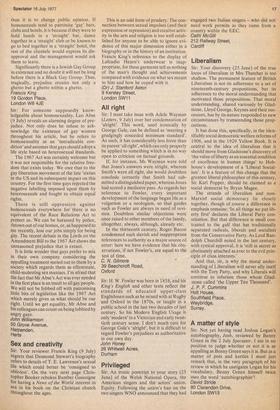Liberalism
Sir: Your discovery (25 June) of the true locus of liberalism in Mrs Thatcher is too shallow. The permanent feature of British Liberalism is not its adherence to a set of nineteenth-century propositions, but its adherence to the moral understanding that motivated those propositions. That moral understanding, shared variously by Gladstone, Lloyd George, Keynes and their successors, has by its nature responded to new circumstances by transcending those propositions.
It has done this, specifically, in the identifiably social democratic welfare reforms of 1906, and in the 1929 Yellow Book. It is central to the idea of liberalism that it should move from Gladstone's discovery of 'the value of liberty as an essential condition of excellence in human things' to Hobhouse's development of a 'Liberal Socialism'. It is a feature of this change that the greatest liberal philosopher of this century, Sir Karl Popper, should be claimed as a , social democrat by Bryan Magee.
The strands of liberalism and nonMarxist social democracy lie closely together, though of course a difference in emphasis remains: 'In all things we put liberty first' declares the Liberal Party constitution. But that difference is small contrasted to the gulf that has traditionally separated radicals, liberals and socialists from the Conservative Party. As Lord Randolph Churchill noted in the last century, with cynical approval, it is 'still in secret as obstinately attached as ever to the evil principle of class interests.'
And that, sir, is why the moral understanding of Liberalism will never ally itself with the Tory Party, and why Liberals will continue to infuriate those whom Gladstone called 'the Upper Ten Thousand'.
J. P. F. Cummins Holt House, Southfield Place, Weybridge, Surrey.


































 Previous page
Previous page